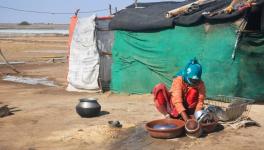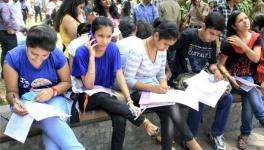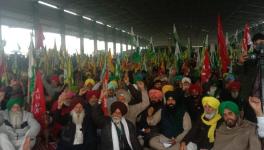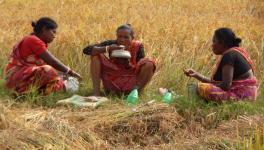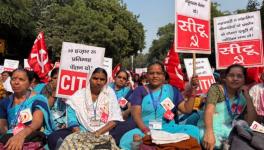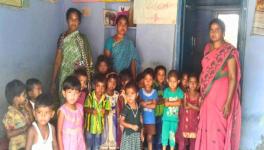Budget 2025-26: Tall Claims, But Health Sector Faces Neglect Yet Again, Says JSA
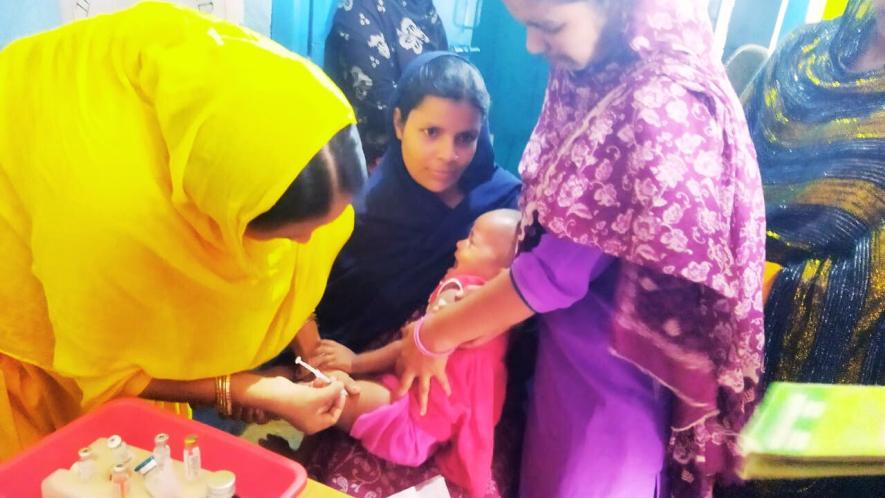
File photo of ASHA workers carrying out immunisation in West Bengal. Image Credit: Madhu Sudan Chatterjee
New Delhi: Reacting to the Union Budget 2025-26 proposals for the health sector, the Jan Swasthya Abhiyan (JSA) said there was a wide gap in what the Centre has said and what it has done in terms of allocation of funds.
“In her budget speech, the Finance Minister emphasised “access to high-quality, affordable, and comprehensive healthcare” as a major component of Viksit Bharat. Although the statement rightly emphasises the role of health in overall development, the Union government’s financial allocations do not reflect a similar level of priority accorded to health,” the JSA said in a statement.
It noted that while in nominal terms there was some increase in the total allocation for the Ministry of Health and AYUSH taken together compared to the previous budget from Rs 94,671 crore (2024-25 Budget Estimate) to Rs 10,3851 crore (2025-26 BE). Although this looks like a significant increase of Rs 9,180 crore in nominal terms, if adjusted for the effect of inflation, this means an increase of only 3.04% in real terms, it said.
JSA said as a percentage of GDP, the allocation for health has declined from 0.37% to 0.29% between 2020-21 Actual Expenditure and 2025-26 BE. The share of health in the total Union Government budget has declined from 2.26% to 2.05% in this period, it noted.
Questioning the priorities of the government, JSA said there was a cut in funds for schemes that contribute to strengthening the public system and protecting the health of most vulnerable sections of the society, such as the National Health Mission, Pradhan Mantri Swasthya Suraksha Yojana.
“In contrast, schemes to promote commercial interests- like the Pradhan Mantri Jan Arogya Yojana (PMJAY), the Digital Health Mission, are being rewarded with higher allocations- despite failures,” it added.
Pointing out the continued neglect of the flagship National Health Mission (NHM), aimed at improving primary and secondary care on maternal and child health, disease control programmes and non-communicable diseases, JSA noted that many of these services had suffered during the lockdown.” However, since 2019-20, NHM allocations have been declining in real terms.”
Because of this, essential services like safe deliveries, vaccination for children, and treatment of TB provided earlier can no longer be provided with limited resources. Also, NHM money also goes into paying remunerations for frontline health workers like ASHAs.
“Cuts in the NHM budget mean a reduced budget for paying these workers, who have been demanding minimum wages for a long time,” it said.
JSA said there was a need to expand the network of Health and Wellness Centres (HWCs) to ensure quality comprehensive primary care, which are a part of the NHM budget.
“In the context of considerable budget cuts for NHM, the plight of HWCs also remains unclear! We have also been demanding that the new name – Arogya Mandir - given to HWCs should be withdrawn,” it added.
In contracts, PMJAY, known to largely benefit the private sector and exclude the most marginalised, has been rewarded with higher allocations, said the people’s health movement.
“In the 2023-24 budget Rs 7,200 crores was allocated and only Rs 6,670 could be spent! Allocation has been further increased by 24% compared to previous year to Rs 9,406 crore! PMJAY eating up a larger share of the allocated budget remains a cause of concern while it fails to deliver,” it added.
JSA pointed out that the rise in allocation for PMJAY should be seen in conjunction with the announcement of 100% foreign direct investment in health insurance, further opening the market to global health insurance companies, “a clear sign of increasing privatisation of the health sector.”
“Blind obsessions to promote commercial interest needs serious introspection,” said JSA, adding that a large part of the Dalits, adivasis and other marginalised sections hardly receive care from the private sector under government funded insurance schemes like PMJAY.
On WHO, international agencies budget being cut, JSA said noted that while India claims to play a major role in global politics and international health, it was a “surprise that the Union Government has cut its allocation for international agencies like WHO, UNICEF from Rs 179 crore to a mere Rs 96 crore. At a time when the US had withdrawn support from the WHO, India should have stepped up its spending rather than cut down!”
JSA also said that removal of basic customs duty (BCD) on some life-saving drugs for cancer and rare diseases would not make those affordable. Instead, the government should have announced generic production of some of these drugs for the poor.
While welcoming the announcement of Day Care Cancer Centres in all district hospitals, JSA said implementation held the key.
“Earlier, the announcement of health and wellness centres only led to a change in the sign boards with no real enhancement in services offered,” it noted.
It also lamented the poor spending on health research. “As a proportion of total health expenditure, health research remains a meagre 3.8%, miniscule increase from 3.5%. With the COVID-19 experience just behind us, it was expected that the government would invest heavily in health research, an aspiration that remains unfulfilled,” read the statement.
Noting that mental health and disability continued to be neglected, JSA said: “The paltry public spending on the existing National Mental Health Programs (NMHP) remains a major concern. Furthermore, even these allotted funds remain largely underspent. Various Union Government funded mental health institutions continue to face neglect.”
On the 4% increase in allocation for the Department of Empowerment of Persons with Disabilities, JSA said it “falls far short of addressing the rights of people living with disability. The total allocated to the DEPwD as a percentage of the overall budget is a mere 0.025 %.”
Get the latest reports & analysis with people's perspective on Protests, movements & deep analytical videos, discussions of the current affairs in your Telegram app. Subscribe to NewsClick's Telegram channel & get Real-Time updates on stories, as they get published on our website.









